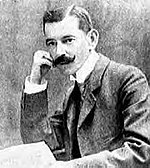Jose de Diego
| José de Diego | |
|---|---|

Father of the Puerto Rican Independence Movement
|
|
| Born |
José de Diego y Martínez April 16, 1866 Aguadilla, Puerto Rico |
| Died | July 16, 1918 (aged 52) New York City, United States |
| Occupation | Statesman, poet, attorney, legislator, journalist |
| Nationality | Puerto Rican |
| Notable works | A Laura |
| Spouse | Georgina Blanes |
| Children | José, Elisa Estrella, Georgina |
José de Diego y Martínez (April 16, 1866 – July 16, 1918), was a statesman, journalist, poet, lawyer, and advocate for Puerto Rico's independence from Spain and from the United States who was referred to by his peers as "The Father of the Puerto Rican Independence Movement"
De Diego, (birth name: José de Diego y Martínez ) was born in Aguadilla, Puerto Rico. He was the son of Felipe de Diego Parajón, a Spanish Army Officer from Asturias, Spain, and Elisa Martínez Muñiz, a native of Puerto Rico. De Diego received his primary education in the town of Mayagüez and after finishing his primary and secondary education went to Spain. There he attended and graduated from the Polytechnic College of Logroño. While in Spain, de Diego collaborated with the newspaper El Progreso (Progress), founded by fellow Puerto Rican José Julián Acosta y Blanco, which attacked the political situation in Puerto Rico; this led to various arrests which eventually forced him to leave Spain to return to the island.
In 1886, de Diego had an unhappy love affair with Carmen Echavarría which led him to write one of his most acclaimed poems, "A Laura" ("To Laura"). This poem became very popular among the romantics of that time. He became known as the "Father" of the "Modern Puerto Rican Poetry Movement". Among his most noted poetry books are:
De Diego returned to Spain and studied law in Barcelona. He received his law degree and continued his studies until he graduated with a doctorate in law in 1892. He then returned to Puerto Rico to advocate for its autonomy from Spain. The 1876 Spanish Constitution created a centralized state, and ended the ancient system of Autonomies and commonwealth kingdoms. Many in the wealthier regions such as Catalonia, Galicia, the Basque Provinces, Cuba, Philippines and Puerto Rico sought to reinstate it. It coincided with the growth of the republican sentiments. De Diego set up his law practice in Arecibo and was the founder of the newspaper La República (The Republic). Together with Román Baldorioty de Castro, de Diego founded the Autonomist Party in 1887. Luis Muñoz Rivera and Rosendo Matienzo Cintrón, who were members of the party, formed a committee which ultimately convinced the Spanish governor in the island Práxedes Mateo Sagasta to support the idea of autonomy for Puerto Rico within the Spanish kingdom. De Diego did not accompany Muñoz Rivera and Matienzo Cintrón because he was a republican: believed that Spain should be a Federal Republic and Mateo Sagasta's party followed the ideals of the monarchy. De Diego envisioned the establishment of a Confederation of the Spanish-speaking islands in the Caribbean which would include the Dominican Republic and Cuba, known as the Antillean Confederation. In 1897, the Spanish Parliament granted the Charter of Autonomy to Puerto Rico, pursuant to Art. 82 of the Constitution of Spain acknowledged, after Gov. Mateo Sagasta's election as Prime Minister. Puerto Rico became the first Spanish Autonomous Region,-today there are 20. Muñoz-Rivera became the president of the Autonomous province and De Diego celebrated Muñoz Rivera's accomplishment and was named Sub-Secretary of Justice and Government. Puerto Rico's autonomy, however was short-lived, being subsequently invaded by the United States.
...
Wikipedia
